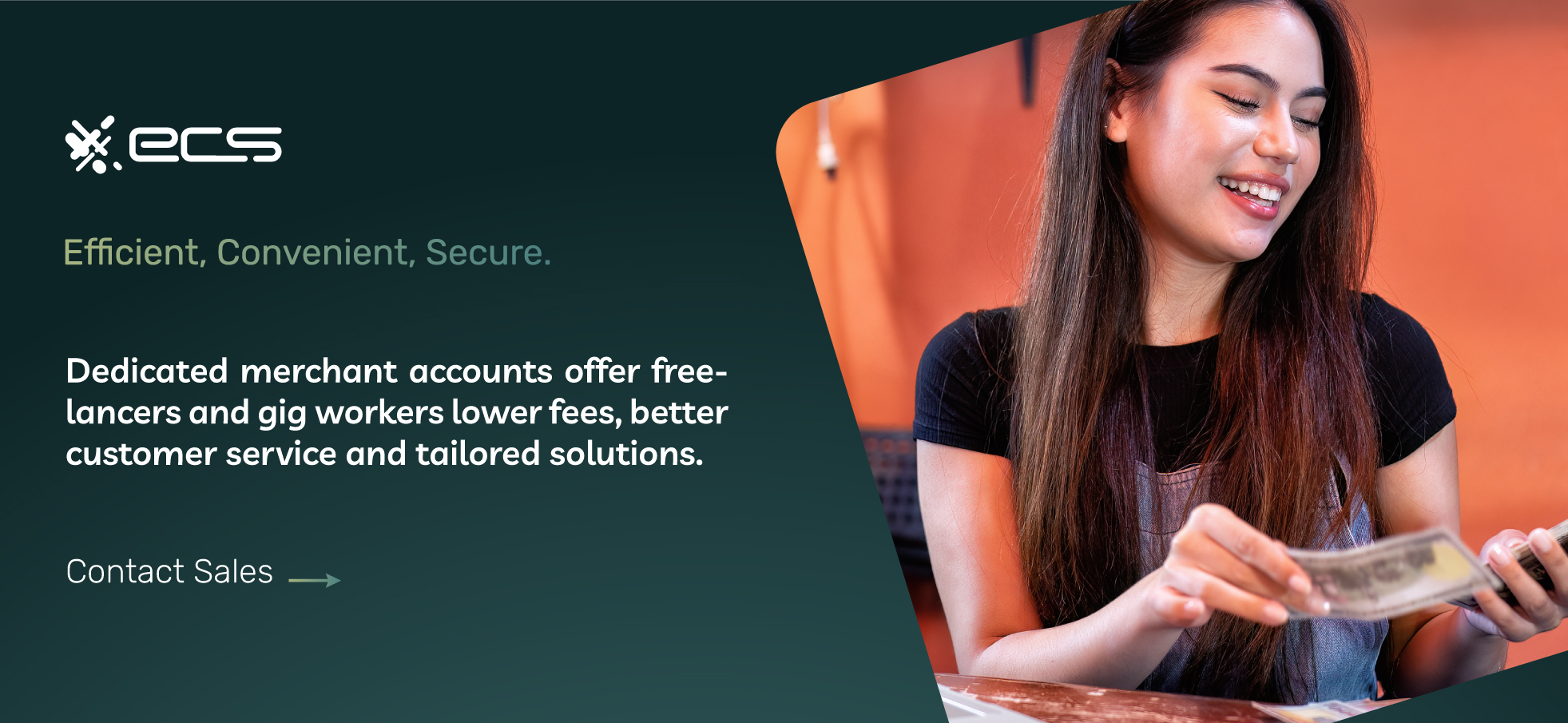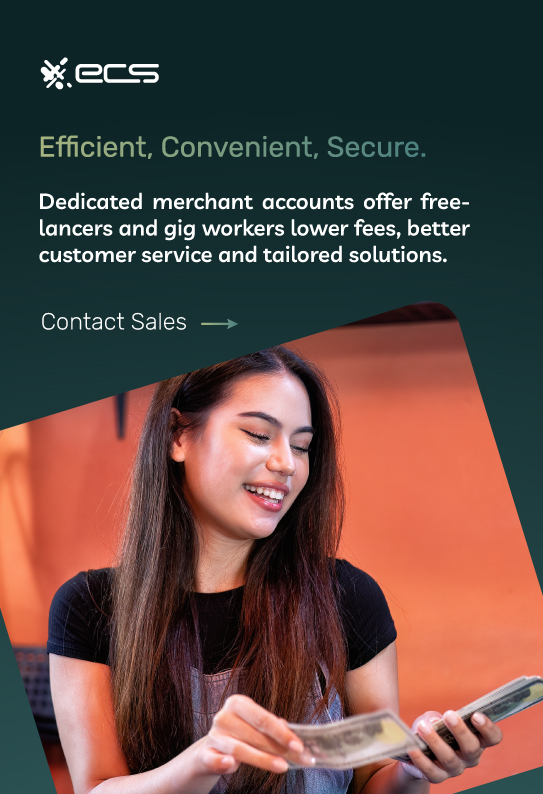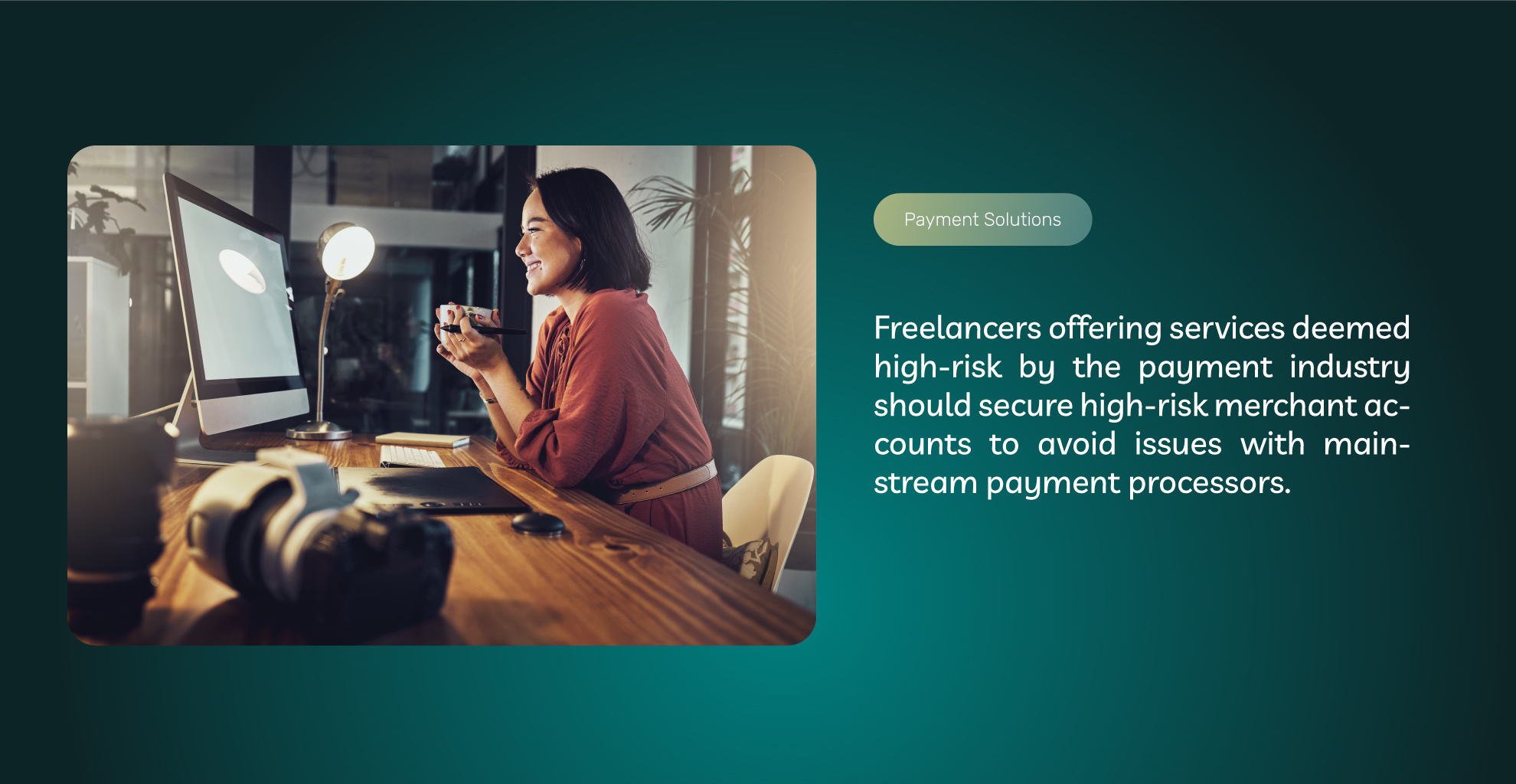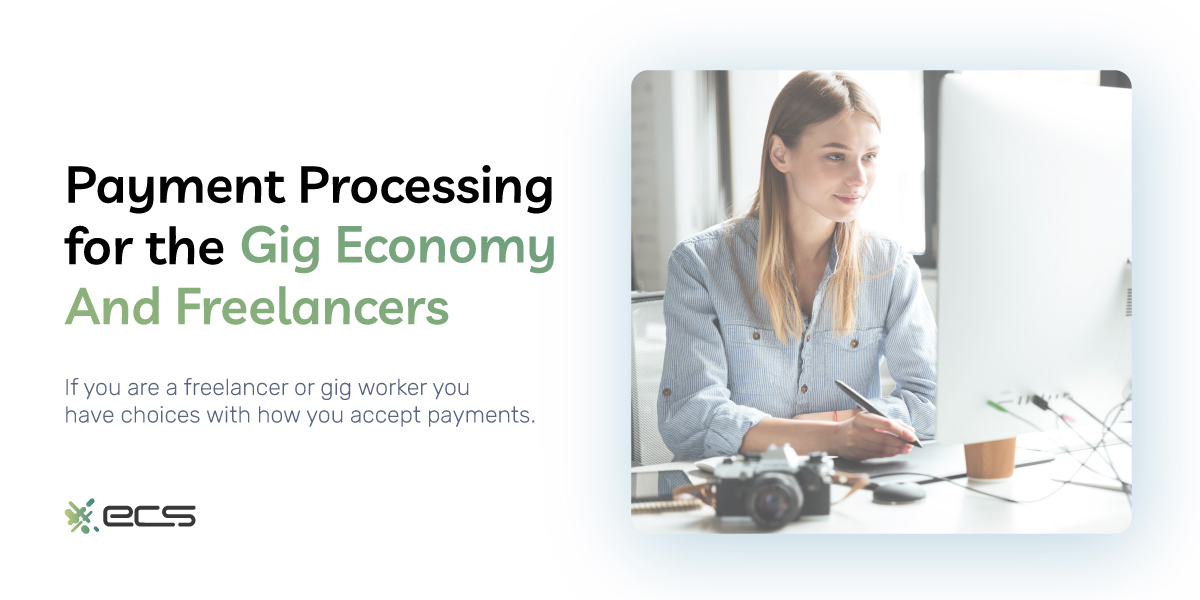Over the past few years, remote work has gone from a niche form of employment to becoming a major part of the workforce. Companies are hiring talent from around the country, opening opportunities that didn’t exist before.
One of those opportunities is for freelance and gig workers. As companies grow more comfortable with non-traditional work situations, they are more likely to use freelance workers to fill gaps in their teams.
But beyond just companies, consumers are also using gig workers more for short tasks or to provide essential services like home repair or car maintenance.
This has created a flourishing gig and freelance economy. However, freelancers and gig workers have one issue: how to receive payments.
Payment processing can be complicated. Without the right solutions, freelancers and gig workers can lose thousands of dollars in fees and other costs.
To help you grow your freelance business and process payments professionally, we’ll go over the best solutions so you can keep more of your hard-earned money in your pocket with each transaction.
Payment Processing Basics
If you’re new to gig work or even experienced, you may not be familiar with payment processing and how it works. You want to understand a few basic terms to decide which options work best for your needs.
You have a few general options for payment processing that fall into the following categories.

Peer-to-Peer Payment Services
Peer-to-peer (P2P) payment services and apps allow individuals to send funds to each other. Popular payment apps for freelancers are Cash App, Venmo, and Zelle. However, P2P apps don’t send funds directly between users. The app company acts as an intermediary. For example, with Cash App, the funds go through Block, Inc., a financial services company.
Cash App and similar services have a fee structure that depends on how fast you want funds transferred. If you want funds transferred instantly, fees are generally involved. There are generally no fees if you wait for the standard transfer time of 1-3 business days.
P2P apps are best for sending funds between friends and family without sharing payment information. They are not, however, suited for business. P2P apps are infamous for their lack of customer service. So if there is ever a problem, you may be out of luck…or out of hair, from pulling it out trying to correct your finances.
Also, P2P apps may not look as professional and can make your freelance business appear untrustworthy. There have been many scams revolving around these P2P apps. As a result, it can make customers hesitant if that’s your only payment option.
Hybrid Payment Processing Services
Companies like PayPal offer hybrid payment services, offering merchants both P2P and money transfer options. Paypal works similarly to P2P apps, but it has additional features for invoicing, accepting partial payments, and branding your payment workflow to legitimize your business.
The drawbacks of services like PayPal are the high fees and lack of recourse if PayPal feels you used the account improperly. PayPal’s fees are extremely high compared to other services. In addition, the fee structure is complicated to understand, and you’re often never sure what rate you are paying until a payment is received.
Beyond that, freelancers and gig workers have countless stories about having their PayPal accounts frozen. When this happens, you have very little recourse, and it often takes weeks to resolve.
During this time, you have no access to your funds. Even worse, PayPal may never unfreeze the funds, depending on the circumstances. This delay can be devastating for a small freelance or gig business and can sometimes put you out of business.
Paypal is best used as a secondary payment option for customers with a preferred payment method through one of these services. However, it should not be your primary way of accepting payments. It’s simply too expensive and too risky to depend on, considering your livelihood is at stake.
Also, when accepting international payments for freelancers, the PayPal fees are much too high and vary depending on market rates or exchange rates for the local currency.
Aggregate Payment Processors
Aggregate payment processors are companies like Square or Stripe, although other options are available. Services like Square & Stripe blur the line between a real business merchant account and a payment service like PayPal.
Aggregate payment providers essentially pool all of their customers together and then process them all under one main merchant account run by the company. For example, if you use Square, you don’t have your own merchant account despite them advertising it that way. Instead, you share a merchant account with all other users on the Square platform. This is why it’s referred to as an aggregate payment processor.
The benefit of this type of setup is that you can generally be approved rather quickly. The application process is short, and you don’t need to provide much information. As a result, you can start processing within a day or so.
The downsides are similar to those of Paypal and other services: you pay much higher payment processing fees. Because the platform pools together every merchant, you must pay the same fees as someone with more risk. So, if you’re a trustworthy merchant, you pay more than you would if you had your own merchant account.
Another issue similar to PayPal is account freezes and closures. If Square or Stripe freezes your account, you have very little recourse. Many times, these situations take a month or more to resolve. As with PayPal, you cannot access any funds in your account during this time.
While Square or Stripe are generally better for freelancers, they still have issues that pose a great risk to your business. To avoid these issues, there is a better option for freelancers and gig workers, and that’s what we’ll explain next.
Merchant Accounts Through A Merchant Provider
Almost every business you deal with uses a merchant account they obtained through a payment processor, also known as a merchant account provider. Unlike Square or Stripe, when you obtain a merchant account through a payment processor, you are the only person conducting transactions through that account.
This means your fees are tailored to your specific freelance or gig business. Most freelancers and gig workers are low-risk when it comes to processing. So, you’ll pay substantially lower fees with your own merchant account, making it a more cost-effective option.
Beyond that, having your merchant account gives you far more options and better customer service to deal with any issues. You can contact your payment processor directly to solve any problems before they threaten to close your account.


Best Payment Processing Options For Freelance And Gig Workers
Freelancers and gig workers share some of the same payment needs but differ in a few important ways.
Freelancer Payment Solutions
Freelancers who provide a service will want to use their own merchant account through a payment processor such as ECS Payments. They need to project a professional image, and having their own merchant account helps them achieve that image.
As a freelancer, you may also choose to create an LLC or limited liability company to accept payments. This can help you take advantage of certain tax implications of gig payments and also limit your liability in certain cases.
With an LLC, you’ll want your own merchant account and a business bank account to receive all your funds earned through freelancing. Personalized merchant accounts simplify overall bookkeeping and financial planning for freelancers.
This method of financial management for freelancers offers the lowest fees, and the most professional image, while still providing options to your clients when receiving payments for your services.
Gig Economy Payment Processing
Gig workers often have to receive payments through the payment service of the platform they are on. For example, if you’re a gig worker on Uber or DoorDash, you have to use the payment services included through the Uber platform.
This can limit your options, but you still should choose the option with the lowest fees in these cases. Generally, you can get your money faster by paying higher fees to the platform, but that’s not a great option, and you should avoid it if possible.
Most gig platforms provide additional secure payments for gig workers. Direct deposit for gig workers or bank transfers usually have lower fees than P2P apps or instant payment platforms. Both of these options can provide payment security in gig economy situations.
While these platforms usually handle the payments, smart gig workers and business owners are obtaining their own merchant accounts to attract new customers outside of the platform.
Most platforms will have rules regarding work outside the platform, but they can’t forbid you from building your own clientele. Doing this helps you diversify your income along with boosting your revenue since you can avoid the gig platform fees.
To take advantage of this, you will still want to apply for your own merchant account, similar to a freelancer worker. This way, you can bill your off-platform clients professionally and with far lower fees than any other payment method.
Gig economy payment trends suggest that this is a fast-growing area for gig economy banking and payment processing.
Cryptocurrency Payments In Gig Economy
Cryptocurrency represents a small percentage of digital payments for transferring money in the gig economy. However, crypto provides mobile payment options for some users with no other options.
High-risk Payment Processing
An important topic for freelancers and gig workers to consider is high-risk processing. High-risk processing is payment processing for services that the credit card and payment industry deems high-risk. In this context, high-risk refers to the risk of fraud or chargebacks.
There are freelancer services that may seem mundane but are actually high-risk. For example, the payment industry considers certain mentoring, coaching, or digital delivery services to pose high risks.
Financial institutions and companies like Square, Stripe, and Paypal strictly forbid any high-risk processing on their platform. You may still receive approval and be able to start accepting payments, but eventually, the platform will suspend your account and freeze the funds.
If you’re a freelancer or gig worker and happen to work in a high-risk industry, you need to secure a high-risk merchant account through a provider such as ECS Payments. ECS Payments specializes in freelance and gig merchant accounts and can provide you with payment processing even in high-risk categories.
Contact ECS Payments today if you work in a high-risk industry and require a merchant account.

Choosing A Merchant Account Provider
Whether you’re a freelancer or a gig worker looking to gain clients outside a gig platform, you’ll need a merchant account. A merchant account will allow you to receive payments with the lowest fees and provide the most security that your funds are always safe and available.
When choosing a merchant account and payment process, there are some things to look for to find the best option.
Customer Service
Your payment processor should have in-house customer service and technical support to answer your questions. Payments are critical to your livelihood as a freelancer or gig worker. You want a payment processor that is there for you if there is ever a technical issue that needs immediate resolution.
Payment Options
A merchant account should give you access to various payment options for your clients. These can include credit and debit cards, digital wallets, ACH payments, mobile processing using mobile devices, and more.
Certain payment gateways for independent contractors also offer additional features, such as invoicing solutions for freelancers and earning tracking for gig workers. You can also connect these to your accounting software for better bookkeeping.
Ensure your merchant account offers these enhanced contract worker payment systems so you can provide your clients with a smooth billing process.
Low Fees
You want to avoid merchant account providers that offer the same fees to every freelancer. This flat-rate fee generally means you will pay more than you must. A trusted payment processor will treat you as an individual and examine your processing volumes and industry to find you the absolute lowest rates for every transaction.
Start Accepting Freelance & Gig Payments Today
If you’re a freelancer or gig worker and have questions about obtaining your own merchant account, contact ECS Payments.
ECS Payments offers personalized service for freelancers and gig workers. Our team can find the perfect processing solution with the lowest possible costs. We also work with high-risk industries, so no matter what industry you are in, we can help you.
Contact ECS Payments to learn more about our innovative payment solutions for freelance and gig workers.
Frequently Asked Questions for Gig Economy Payment Processing
Gig workers and freelancers have several payment processing options available, including:
•Peer-to-peer payment services like Cash App, Venmo, Zelle
•Hybrid payment services like PayPal
•Aggregate payment processors like Square or Stripe
•Merchant accounts through a merchant provider.
Obtaining a merchant account through a provider may be the best option for most freelancers as it offers several advantages, including:
•Tailored fee structures
•Increased professionalism for the merchant side
•Better customer service
•More control over the payment process
•Lower fees
•Greater security
Freelancers must consider factors like customer service, payment solution options, and fee structures tailored to individual business needs. Providers like ECS Payments offer personalized service and innovative solutions designed specifically for freelancers and gig workers. To inquire about a merchant account with ECS Payments, contact info@ECSPayments.com.
